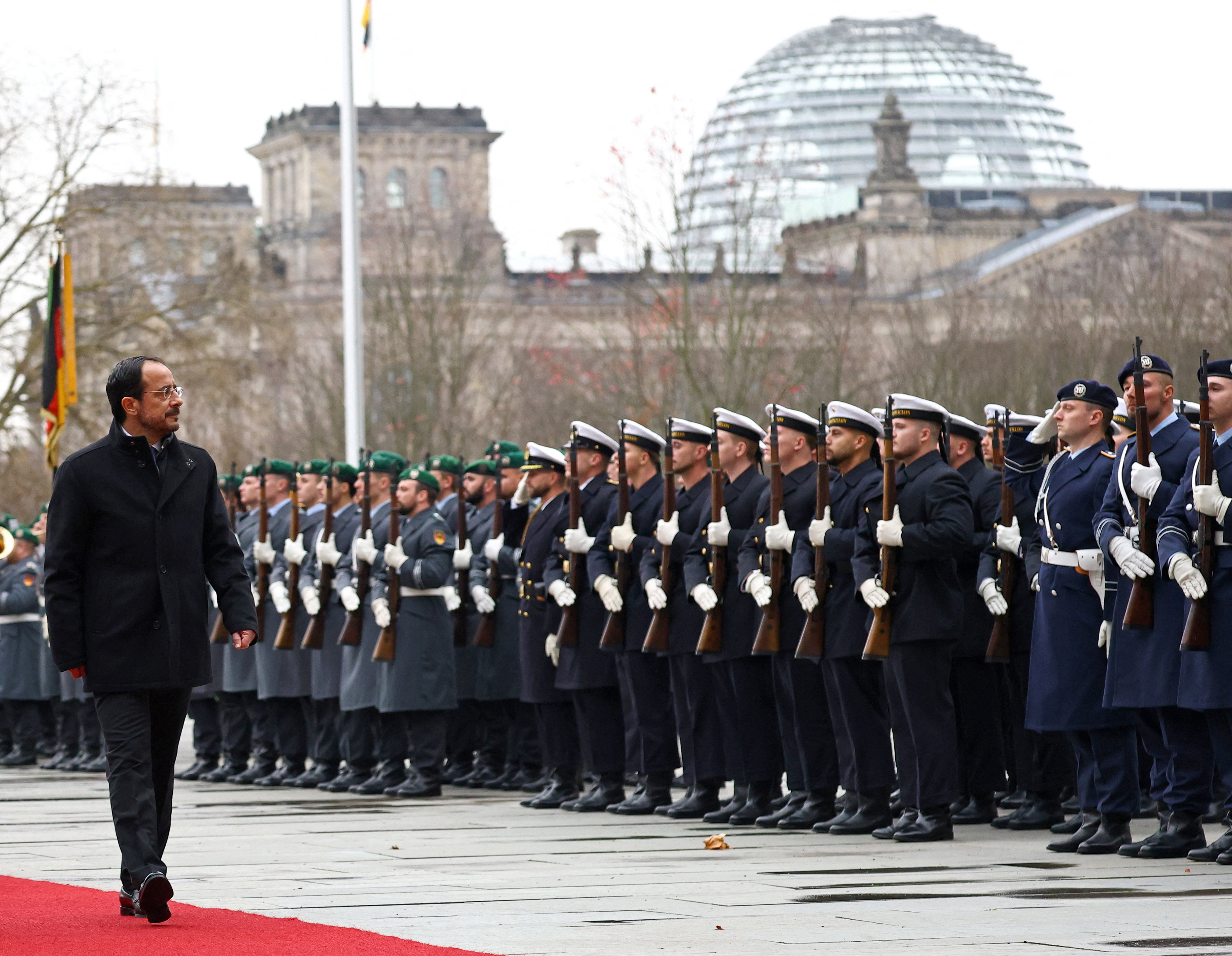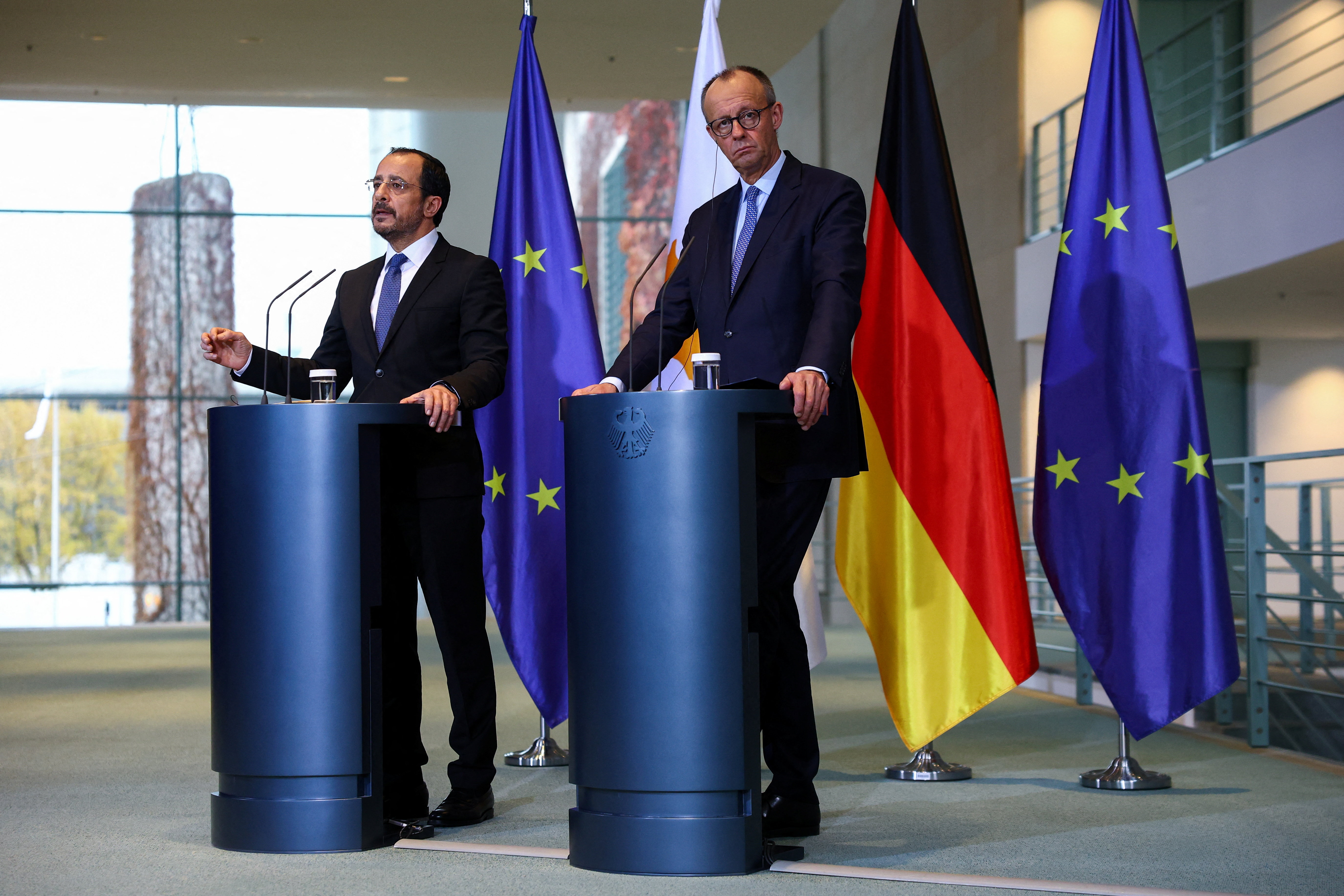German Chancellor Friedrich Merz on Friday praised the “extremely constructive” approach taken by Cyprus regarding relations between the European Union and Turkey, as it prepares to undertake the Council of the European Union’s rotating presidency during the first half of next year.
Speaking at a joint press conference with President Nikos Christodoulides’ during the latter’s visit to Berlin, he said that he and Christodoulides had “exchanged views” on relations between the EU and Turkey “against the backdrop of the geopolitical situation”.
On this point, he said he had “emphasised the need for closer cooperation with Turkey”, and that he had “referred to my visit to Turkey and its results, as well as how we could lead ourselves to a rapprochement between the EU and Turkey”. Merz visited Turkey and met the country’s President Recep Tayyip Erdogan on October 30.
“I am of course aware of the interests and concerns of Cyprus in relation to these issues,” he said.
He was then asked whether Germany “could help to overcome Turkish intransigence in relation to the Cyprus issue” and answered that he and Christodoulides had “spoken in detail about the situation as it is developing in Cyprus”.

“[Christodoulides] appealed to my side to support him so that the problems and the division of the island can be over come step by step, and to utilise the good relationship we maintain with Turkey to take the first steps in this direction,” he said.
He added that he and Christodoulides had “discussed different versions of how this could be achieved”, and that Christodoulides had given him “a very specific proposal, which we discussed”, and to which he had “listened with great interest”.
That proposal, he said, foresees that during Cyprus’ six-month term as the holder of the Council of the European Union’s rotating presidency, “we could actually take some steps here”.
To this, he said he had “expressed Germany’s willingness to participate actively in this process”.
“I personally consider it a great honour that [Christodoulides] places such emphasis on the role of Germany and on my personal role. I referred to my visit to Ankara and we will try in the coming weeks to achieve the first steps of progress,” he said.

He added that he is “prepared to undertake this task and to support it with my colleagues in the best possible way, so that the division can at least in some ways be overcome, step by step”.
Christodoulides was then asked what he would like Merz and the German government to do regarding the Cyprus problem, and in his answer, he said that he wished to “publicly thank [Merz] for his response and readiness … to play a more substantial role in the efforts to restart talks to resolve the Cyprus problem”.
“As he rightly stated, we discussed very specific ideas on how Germany can help in this direction. There is also a positive moment at this time, which is [our] assumption of the presidency of the Council of the EU, and we, as always, through a positive approach, are ready to achieve a mutually beneficial state of affairs for the Cyprus issue and for relations between the EU and Turkey,” he said.
Later in the press conference Christodoulides also made reference to Turkey’s efforts to participate in the EU’s Security Action for Europe (Safe) common defence procurement programme.
“If Erdogan insists on his positions on a two-state solution in Cyprus, Turkey will certainly not come close to the EU. Therefore, it depends on Turkey whether it will come close to the EU,” he said.
“The important thing is that both the EU and the international community, whatever Erdogan says, in relation to the solution to the Cyprus problem, [is that] the solution is based on the [United Nations] security council’s resolutions, the principles and values of the EU.”
He added that for a country to be able to participate in the Safe programme, “it must have a defence agreement, a security agreement with the EU”.
“At the moment at which we are talking, Turkey does not have such an agreement with the EU,” he said.
Away from the matter of the Cyprus problem and of Turkey, both Christodoulides and Merz spoke about the EU’s multiannual financial framework – the EU’s budget for the period covering the years between 2028 and 2034.
On this matter, Christodoulides said that “discussions must be completed as soon as possible”, and that “we must conclude the discussions and decide on the issue by the end of 2026”.
The budget, he said, “must on the one hand reflect the new priorities of the EU, such as competitiveness [and] security issues, without on the other hand ignoring traditional policies, such as cohesion”.
Merz, meanwhile, said that the EU will be working on the multiannual financial framework “so that there are quick results”, and said that it will be an “issue which will concern” Cyprus’ holding of the Council of the EU’s rotating presidency.
“It is crucial that Cyprus … make use of the level of negotiations which has already been achieved” when it undertakes the rotating presidency, he said.






Click here to change your cookie preferences